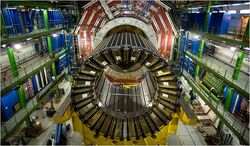No edit summary |
(move to Category:Season 7 (The Big Bang Theory)) |
||
| (28 intermediate revisions by 12 users not shown) | |||
| Line 1: | Line 1: | ||
| − | __NOTOC__<!-- Do not remove this parameter. --> |
+ | The '''Large Hadron Collider''' ('''LHC''') is a massive underground particle accelerator located in Switzerland.__NOTOC__<!-- Do not remove this parameter. --> |
| − | [[File:CERN.jpg|thumb|250px| |
+ | [[File:CERN.jpg|thumb|250px|The main supercollider at CERN.]] |
| − | The '''{{w|Large Hadron Collider}}''' is referenced in ''"[[The Porkchop Indeterminacy]]"'', ''"[[The Cushion Saturation]]"'', ''"[[The Guitarist Amplification]]"'', ''"[[The Large Hadron Collision]]"'', and ''"[[The Wiggly Finger Catalyst]]"''. After receiving some unrestricted grant money, [[Leslie Winkle]] pulled some strings and got [[Howard]] on a research trip to {{w|Geneva}} to check out the CERN Supercollider. (''"[[The Cushion Saturation]]"'') Similarly, [[Leonard]] was asked by the [[California Institute of Technology|university]] to fill in for Professor Norton to attend a conference and see the CERN Supercollider. As he got to bring a guest, [[Raj]] was granted the opportunity to see it with him, after his first and second choices, [[Penny]] and [[Sheldon]], respectively, fell ill. (''"[[The Large Hadron Collision]]"'') Previously, Leonard and Raj had mocked the {{w|doomsday}} theory of some physicists concerned that if the Supercollider actually works, it will create a black hole and swallow up the Earth, ending life as we know it. (''"[[The Porkchop Indeterminacy]]"'') Yet, Sheldon has been dreaming of going to the Large Hadron Collider since he was nine years old and, thus, Leonard's initial decision created a schism. He even put a commitment in the [[The Roommate Agreement|roommate agreement]], stipulating what should happen if either Leonard or himself were able to visit the LHC. According to the Friendship Rider in Appendix C, Future Commitments, Number 37, "''in the event one friend is ever invited to visit the Large Hadron Collider, now under construction in {{w|Switzerland}}, he shall invite the other friend to accompany him.''" (''"[[The Large Hadron Collision]]"'') Sheldon also came close to figuring out why the Large Hadron Collider has yet to isolate the {{w|Higgs boson particle}}, after becoming unburdened by trivial decisions for some time. (''"[[The Wiggly Finger Catalyst]]"'') Additionally, Sheldon's physics-based board game entitled [[Research Lab]] allowed a player to demolish a Soviet-style cyclotron and build the Large Hadron Collider. ("''[[The Guitarist Amplification]]''") |
||
==About the LHC== |
==About the LHC== |
||
| − | An international team has installed the Large Hadron Collider at CERN in a 27-kilometer ring buried deep below the countryside on the outskirts of Geneva, Switzerland. The LHC is the |
+ | An international team has installed the Large Hadron Collider at CERN in a 27-kilometer ring buried deep below the countryside on the outskirts of Geneva, Switzerland. The LHC is the world's most powerful particle accelerator. Its very-high-energy proton collisions are yielding extraordinary discoveries about the nature of the physical universe. Beyond revealing a new world of unknown particles, the LHC experiments could explain why those particles exist and behave as they do. The LHC experiments could reveal the origins of mass, shed light on [[dark matter]], uncover hidden symmetries of the universe, and possibly find extra dimensions of space. |
==LHC Detectors== |
==LHC Detectors== |
||
| Line 28: | Line 27: | ||
*[http://news.discovery.com/space/the-lhc-black-hole-no-braner.html Man-Made (but very tiny) Black Holes Possible] |
*[http://news.discovery.com/space/the-lhc-black-hole-no-braner.html Man-Made (but very tiny) Black Holes Possible] |
||
*[http://cosmiclog.nbcnews.com/_news/2012/07/04/12554487-milestone-in-higgs-quest-scientists-find-new-particle?lite&ocid=ansmsnbc11 Milestone in Higgs quest: Scientists find new particle] |
*[http://cosmiclog.nbcnews.com/_news/2012/07/04/12554487-milestone-in-higgs-quest-scientists-find-new-particle?lite&ocid=ansmsnbc11 Milestone in Higgs quest: Scientists find new particle] |
||
| − | [[Category: |
+ | [[Category:Sciences]] |
[[Category:Reference Materials]] |
[[Category:Reference Materials]] |
||
| − | [[Category: |
+ | [[Category:Season 1 (The Big Bang Theory)]] |
| − | [[Category: |
+ | [[Category:Season 2 (The Big Bang Theory)]] |
| − | [[Category: |
+ | [[Category:Season 3 (The Big Bang Theory)]] |
| − | [[Category: |
+ | [[Category:Season 5 (The Big Bang Theory)]] |
| − | [[Category:The Big Bang Theory]] |
+ | [[Category:Season 7 (The Big Bang Theory)]] |
Latest revision as of 15:34, 14 September 2023
The Large Hadron Collider (LHC) is a massive underground particle accelerator located in Switzerland.

The main supercollider at CERN.
About the LHC
An international team has installed the Large Hadron Collider at CERN in a 27-kilometer ring buried deep below the countryside on the outskirts of Geneva, Switzerland. The LHC is the world's most powerful particle accelerator. Its very-high-energy proton collisions are yielding extraordinary discoveries about the nature of the physical universe. Beyond revealing a new world of unknown particles, the LHC experiments could explain why those particles exist and behave as they do. The LHC experiments could reveal the origins of mass, shed light on dark matter, uncover hidden symmetries of the universe, and possibly find extra dimensions of space.
LHC Detectors
| ATLAS | One of two general purpose detectors. ATLAS will be used to look for signs of new physics, including the origins of mass and extra dimensions. |
| CMS | The other general purpose detector will, like ATLAS, hunt for the Higgs boson and look for clues to the nature of dark matter. |
| ALICE | ALICE is studying a "fluid" form of matter called quark–gluon plasma that existed shortly after the Big Bang. |
| LHCb | Equal amounts of matter and antimatter were created in the Big Bang. LHCb will try to investigate what happened to the "missing" antimatter. |
